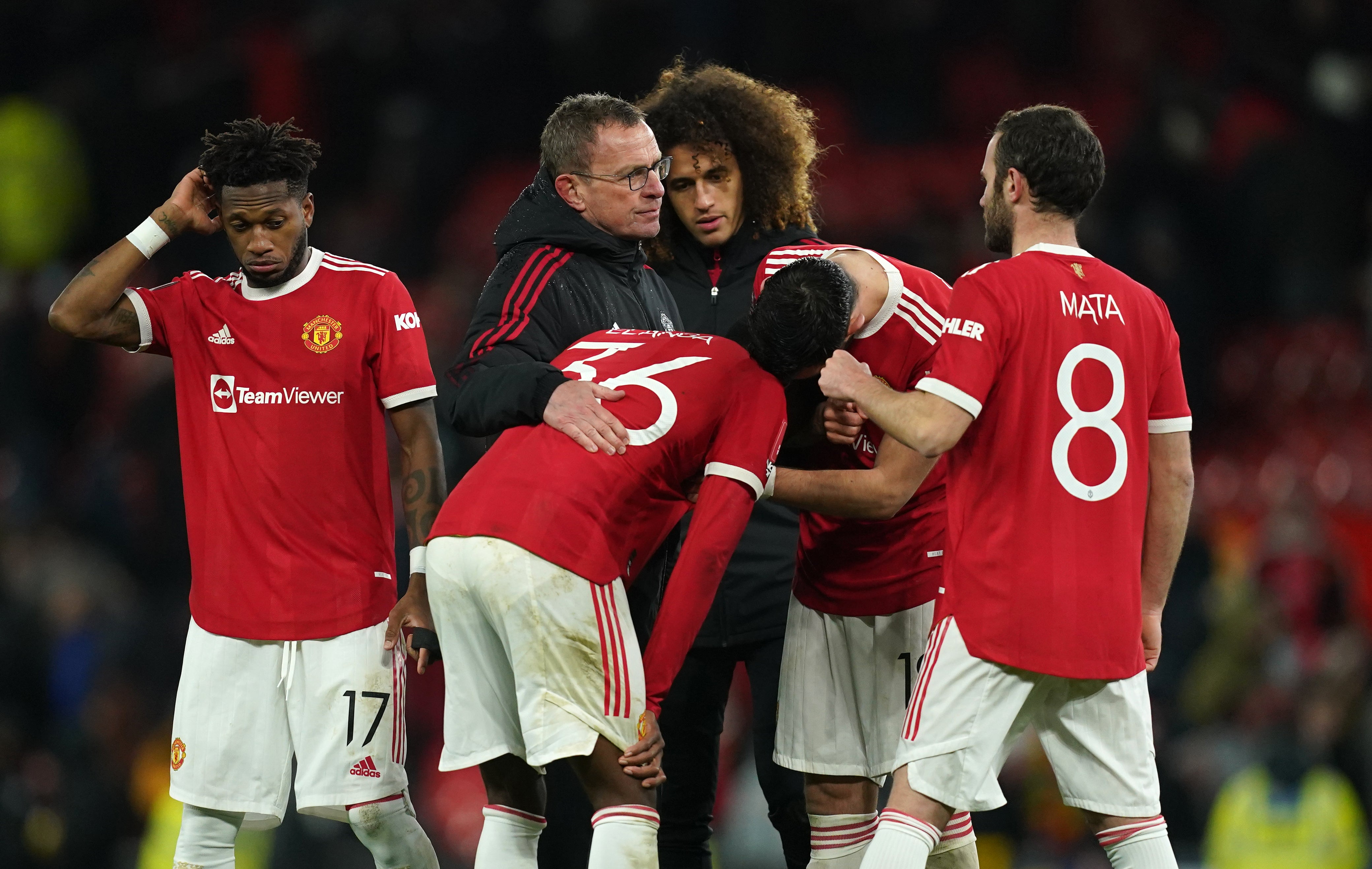
You hit the woodwork. You miss a penalty. You score, but the opposition score a controversial equaliser. You have an open goal to aim at and somehow hit the woodwork again. After two hours of football, you’ve had 30 shots on goal and limited the opposition to six. You’ve put up 4.2 xG and conceded 1.5 xG going the other way, if that’s your sort of thing. You’ve done all that, then you lose on penalties.
That is one way of breaking down Manchester United’s FA Cup fourth round exit to Middlesbrough, which should be considered at least a little unfortunate. This was one of the better displays under Ralf Rangnick to date. The slick, direct transition play that he wants to implement was in evidence, certainly up until Duncan Watmore’s debatable handball and Matt Crooks’s contentious leveller.
On the balance of play, United should have won and would have won with more clinical finishing. “We gave away too many chances, especially in the first half,” Rangnick said in his post-match press conference. “We should and could have easily been up 3-0 after 45 minutes and even in the second half we missed some great opportunities, even after they scored their goal that shouldn't have stood.”
Cristiano Ronaldo’s penalty miss was poor but so too was Bruno Fernandes striking the post with an unguarded goal to aim at, not long after Crooks’s equaliser. Rangnick described that chance as “almost like a penalty” itself. “We have to blame ourselves for giving away and wasting too many opportunities in the game and, in the end, if it's on penalties it's also a question of luck.”
That is all fair and true but an alternative view might be: lads, it was Middlesbrough. United should be expected to dominate the seventh-placed side in the Championship on a visit to Old Trafford. That a line-up approaching something close to full strength had the better of the game, impressing in spells, was no surprise. And then, even if this was the best performance of Rangnick’s interim spell so far, it produced its worst result.
After all, it does not have a lot of competition. This was Rangnick’s eleventh game in charge and only the second defeat. A record of six wins and three draws in the other nine – compared to seven defeats in Ole Gunnar Solskjaer’s final 13 games – is a good one and at odds with the perception that there has been no immediate new manager bounce at Old Trafford and progress has been slow.
Those results do not exactly paint a full picture, though. Wins against Norwich and Brentford were reliant on man-of-the-match displays from David de Gea, and despite Rangnick repeatedly highlighting United’s defensive improvement over the past two months of his management, it is not traditionally a sign of new-found solidity when your goalkeeper is named the Premier League’s player of the month for January.

The FA Cup third round victory over Aston Villa was similarly hard-won, while the draw at Villa Park five days later was the least Steven Gerrard’s side deserved from forcing a late United collapse. Newcastle came away from the meeting at St James’ Park after Christmas believing that they had warranted more than a point too. Eight of the 17 points United have picked up under Rangnick have come in closely fought encounters.
That would be more understandable if United had not, for the most part, played opponents at the wrong end of the table. Nothing in football skews perceptions quite like the fixture schedule. A run of games against weaker or out-of-form opponents can quickly shift narratives. Rangnick’s appointment coincided with one such run, handing Solskjaer’s interim replacement the foundations of a good head start.
Instead, the only really convincing win has been the 3-1 against Burnley, and the most impressive performance before Friday came against the most formidable opponents of all. West Ham barely had a chance of note at Old Trafford before the recent winter break, but then neither did United until Marcus Rashford’s stoppage time winner, and David Moyes’s side have shown a tendency to wilt away to “big six” opposition in any case. United were in control, without truly dominating.
That was the straw to clutch at from Friday’s display. United were superior in every department for the first time under Rangnick. But if they were unlucky to go out against Middlesbrough, then they were also fortunate to take as many points as they did from those games against Brentford, Aston Villa, Newcastle and Norwich, and to find a way past Villa in the previous round.
In Rangnick’s defence, there have now been a string of improved displays starting from the second half at Brentford. The favourable fixture run lasts for a while yet, continuing against bottom-of-the-table Burnley at Turf Moor tomorrow night. But if defeat to Middlesbrough was “a question of luck” as Rangnick says, then it was because United’s luck from recent weeks finally levelled out, leaving a mixed bag of results and performances, and a sense that this new era could have started better.







